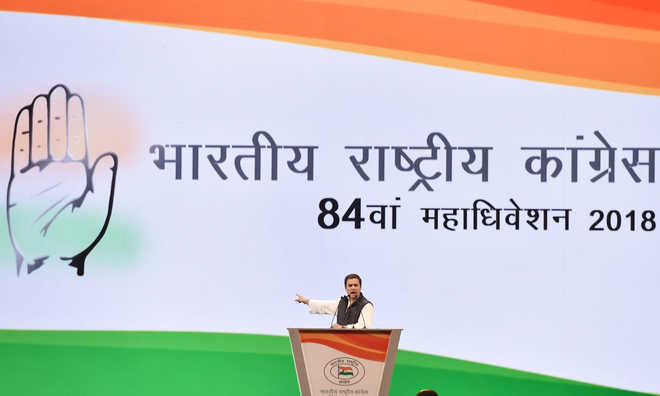
The Congress, which is keen to unite the Opposition ahead of the crucial 2019 general election, expectedly criticised the Modi government for mismanaging the economy. Its 11-page “Resolution on Economic Situation in India” enumerated several oft-debated issues — joblessness, agrarian distress, growing inequality and neglect of the social sector, including economic disruptions due to demonetisation and the hasty implementation of the GST. The Congress though missed a trick by failing to propose feasible alternatives to almost all the issues it has flagged. Urging the Modi government to salvage the farmer, it recalled the pride its Rs 72,000-crore loan waiver largesse, but that had failed to stop suicides. Although, the Congress’ populist but flawed loan-waiver policy is being followed by almost all regimes, the key to a permanent solution is not yet another loan waiver but a comprehensive approach, including diversification of crops and easy market access.
The party’s desire to make the GST regime simpler is desirable. Its suggestion to have “one tax rate” of 18 per cent should raise eyebrows, for no government can impose and hope to survive the imposition of such a high levy. Similarly, the Congress cannot wash its hands of the banking crisis and deposit all the blame on the Modi government. In fact, like the farming crises, this too is a legacy issue. Banks were ailing due to rising NPAs, which were conveniently brushed under the carpet during the 10 years of the UPA regime. The Congress’ concerns about public sector firms are, however, genuine; it is irrational to amalgamate oil companies, which were demerged after due thought. In this, the Congress drew a lesson from its unwise move to merge the two national carriers into a single monolithic Air India.
The Congress’ elaborate criticism of the NDA’s economic policies ends abruptly with a five-point economic “doctrine”. While the Congress cautions the Modi government to shun “inane slogans and meaningless acronyms”, the “doctrine” appears idealistic and academic. The Congress talks about equal economic opportunities, pro-poor programmes, a robust social sector. These are, indeed, high minded slogans but ambiguous and clichéd. The document suffers from a lack of explicit measures that would excite the citizenry.



























